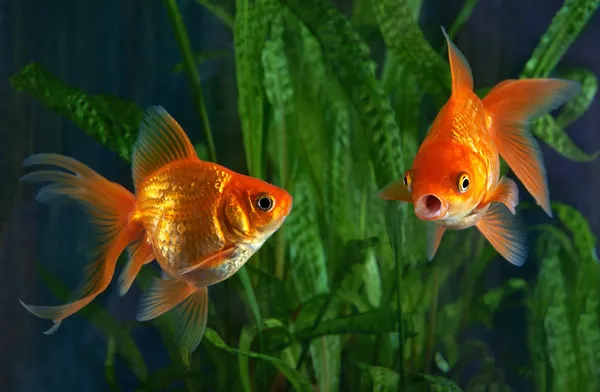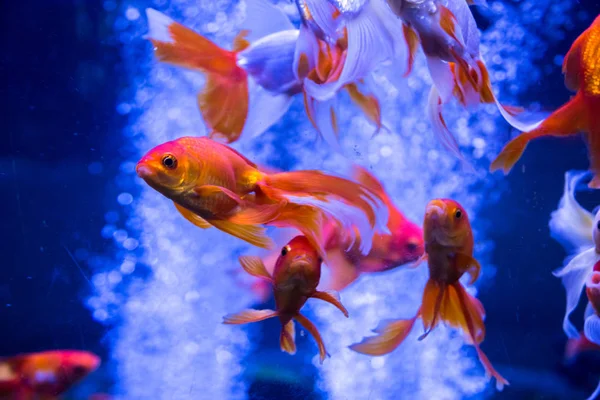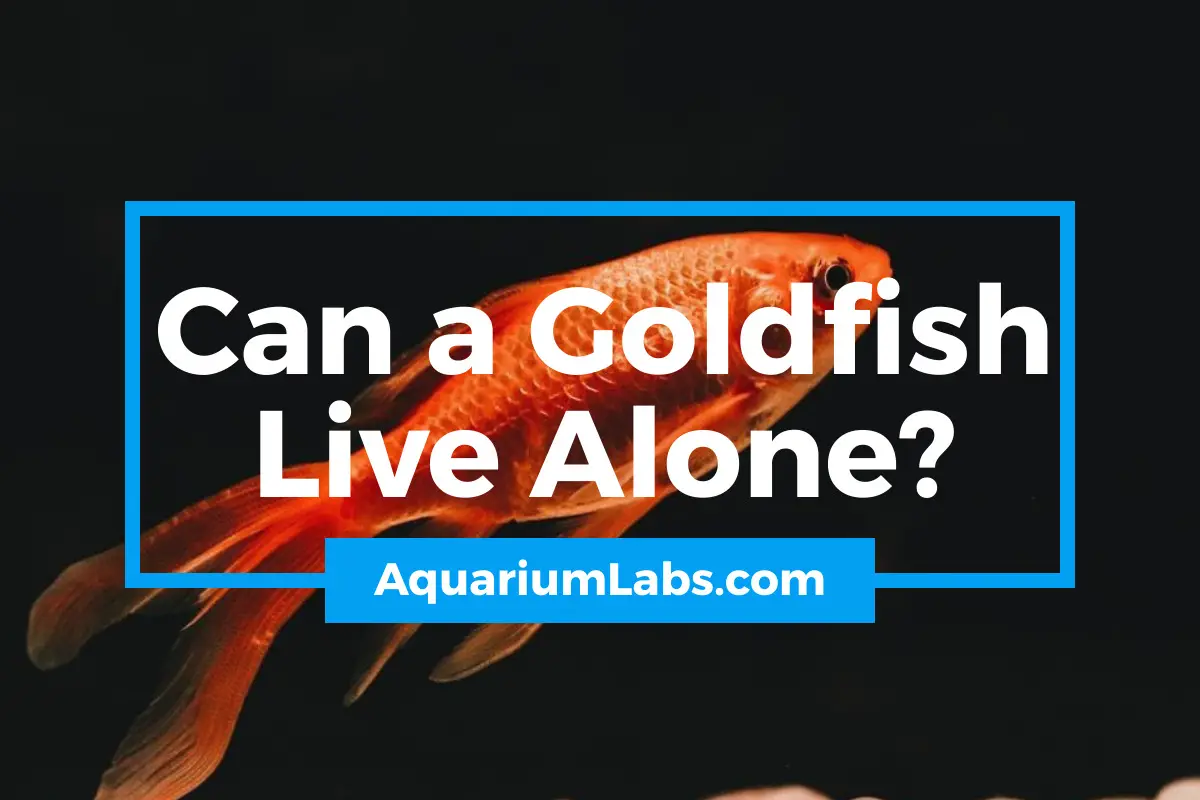When you spend time watching your goldfish navigate its aquarium, does it seem happy and engaged with the world? Or are you worried that it might have grown lonely over time? After all, your fish went from being in a tank full of its own kind to having a place all to itself.
It is easy to anthropomorphize animals like this when their brains are very different from ours. And yet it is true that some animals do have social requirements that need fulfilling. So can a goldfish live alone or do they get lonely when kept on their own?
Can a Goldfish Live Alone?
This is a great question to ask because any social animal, including schooling fish, will become anxious and lonely if kept without their own kind. As medium-sized carp, are goldfish schooling fish? Or do they prefer to live alone?
Goldfish don’t really get lonely in the usual sense because they don’t really school. Occasionally a few goldfish live together for a short period. But only when there is a nearby food source. If one goldfish sees other goldfish gathering together, it may assume that there is a rich patch of algae with grazing on.
Goldfish live alone until it is time to breed. Then you will often see more than one fish coming together to compete for access to mates and spawn. After which, the goldfish will then depart and go back to living alone.
That said, there are benefits to keeping two goldfish or more together. More fish in a tank means more stimulation in an environment that rarely changes much. Enrichment is important for all animals. So I recommend keeping two or more goldfish together. Goldfish don’t get lonely like social fish or mammals do, but they do benefit from other tank mates! These tank mates don’t have to be other goldfish, by the way! Any small fish will work!
Is it Better to Have 1 or 2 Goldfish?
I recommend keeping a single goldfish unless your tank size is large enough to provide space for other fish. Goldfish are cute and very manageable when bought as smaller fish. But even these little babies will grow to be anywhere from 8 inches to a foot long when fully mature. Adult goldfish live alone often because they are simply too large to be kept in large numbers indoors.
If your aquarium is larger than 20 gallons, then definitely try giving your goldfish company! Past 20 gallons, you can keep an extra goldfish per 10 gallons. A big aquarium ensures that there is enough space for all of your fish to explore.

Also, remember that goldfish are very messy fish. They continually root along the bottom even if you offer them enough food! And they create loads of feces. All of this contributes to poor water quality and problems with ammonia, nitrite, and nitrates.
If your goldfish tank is on the smaller side (less than 20 gallons), then it is better for your goldfish to live alone. The water quality will be maintained, and the health of your goldfish will be vastly improved versus crowding them together.
Goldfish Versus Schooling Fish
So now that we’ve established that goldfish can live alone, how do they compare to schooling fish species?
Well, schooling fish absolutely need to be kept with other fish of the same type. If these pet fish are kept alone, they will visibly suffer. They will typically become very shy, hiding in dark corners of the tank or beneath plants. They may or may not eat, and their colors will grow very pale. A schooling fish may even die of loneliness as it constantly thinks its companions are hiding from a predator!
More active fish like Zebra Danios, Neon Tetras, or Giant Danios are just a few of the fish species commonly seen in the hobby that school. There are also shoaling fish, many of which are also smaller fish than goldfish.
A shoal is more like a loose social group. The fish will move independently but remain in a cohesive group. Barbs are an example of a shoaling fish. On the other hand, a school of fish moves in sync with one another!
Goldfish don’t really shoal, either. Again, they may occasionally group up when there is a food source to be exploited. And they may swim in the same direction together at times, especially in the confines of a goldfish pond or fish tank. But goldfish live alone for most of their lives.

Goldfish Tank Mates
If you have decided that you want to give your goldfish a non-goldfish tank mate, then you have plenty of good options!
Setting Up a Tank with Other Fish Species
Other fish can live alongside goldfish with no trouble so long as you remember that both species have specific care requirements that do not always overlap. Water temperature and aquarium size are some of the main issues you will run into.
Goldfish prefer large, cold bodies of water, while tropical fish love warm conditions and can do very well in smaller fish tanks. Let’s take a closer look at how to navigate these challenges!
Water Temperature
The main issue you are going to run into is finding a tank mate that enjoys the same water temperature as your goldfish. Nearly all of the tropical fish you will encounter in a pet store needs heated aquarium water that is 73-83°F.
Comets, shubunkins, and other standard goldfish strongly prefer temperatures no higher than 73°F, with cooler being much better for their health. When kept in tropical conditions, goldfish live accelerated lives, eating and pooping more than they would in cold conditions. This shortens their lifespans considerably.
Fancy goldfish like orandas, lionheads, and black moors are slightly different. They have been tank-raised for so long that they are less cold-hardy than their wild forebearers. Instead, these fish should be kept at room temperature to tropical conditions and are often much better tank mates for tropical fish!
So, what kinds of other fish should you be looking at? Other cyprinid fish are a great place to start! Cyprinids (carp) get along well with each other because they often have similar dietary and temperature needs. The majority are generalists that eat plants and animals alike; many are shoaling, but most can also live alone.
Some cyprinid relatives of goldfish that are also good in cold water include Zebra Danios (Danio rerio), the Dojo Loach (Misgurnus anguillicaudatus), Rosy Barbs (Pethia conchonius), and White Cloud Mountain Minnows (Tanichthys albonubes).
Koi carp (Cyprinus rubrofuscus) are another great tank mate idea to consider! Just remember that these fish grow even larger than goldfish, up to 3 feet long when fully mature!
Aquarium Size
Next, we need to ensure that our tank is large enough if your goldfish get lonely. A goldfish tank should be no smaller than 20 gallons in size, which is really only enough space for a single fish with no other fish crowding it.
If you want more pet fish, then you are looking at a bigger tank. You need at least a 30-gallon tank for your fish to not create too much pollution for a filter to handle.
Some of the possible tank mates I mentioned above, like Rosy Barbs, are not especially small fish either. And since they are shoaling fish, you should be keeping them in groups of 5 or more. A 55-gallon tank is best if you are keeping a goldfish with several tank mates of the same size or larger.
Tank Mate Temperament
And the last requirement is that you choose fish with a similar nature. Stay away from semi-aggressive fish that will claim a territory and defend it. A few cichlids are also cold-hardy, but they tend to nip fins and cause goldfish stress.
Slow swimmers are best because they reflect back a calm living environment. A tank full of fish dashing around can signal to your goldfish that there is danger lurking nearby. Tetras are poor tank mate choices for this reason. These fish tend to continually dart around, picking at each other and fleeing if you move suddenly around the fish tank.
Wrapping Things Up
We’ve covered a lot of ground in this article and have looked at the positives and negatives to keeping goldfish singly, in groups, and with other fish.
So, just to summarize, goldfish can live alone with few issues. They don’t suffer from clinical depression or isolation. Nor will they die of loneliness. But the more stimulating you can make their environment, the better. And other goldfish – or other fish of any kind – really helps make their world just a little more interesting and engaging!
I’m a firm believer in not providing the bare minimum for our pets. So look into giving your goldfish a companion. Just make sure that you have enough space to provide for everyone!
More Goldfish FAQs:
- How Long Can Goldfish Live?
- Are Goldfish Compatible With Angelfish?
- Why Do Goldfish Turn White?
- What Is the Lifespan of a Goldfish?
- Can Angelfish Live By Themselves?

